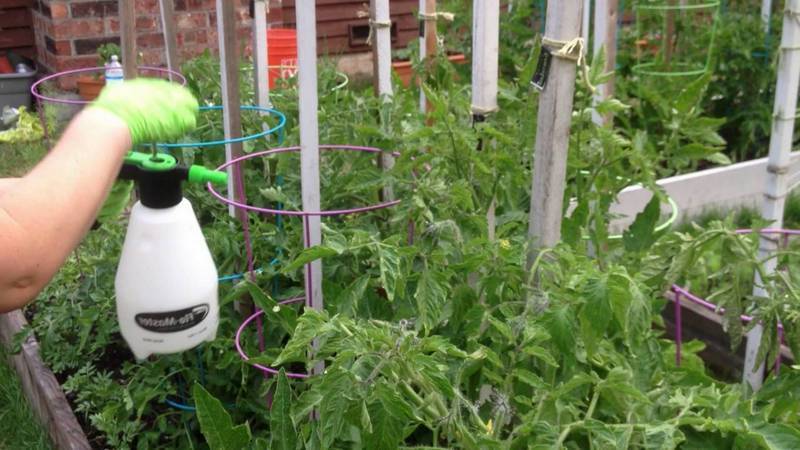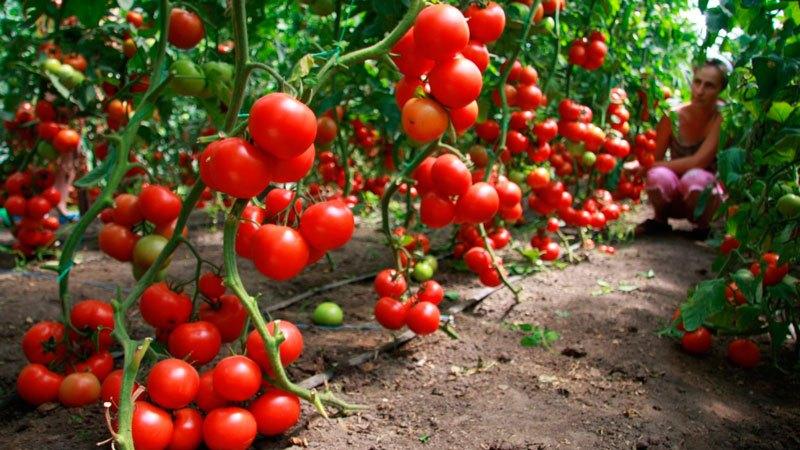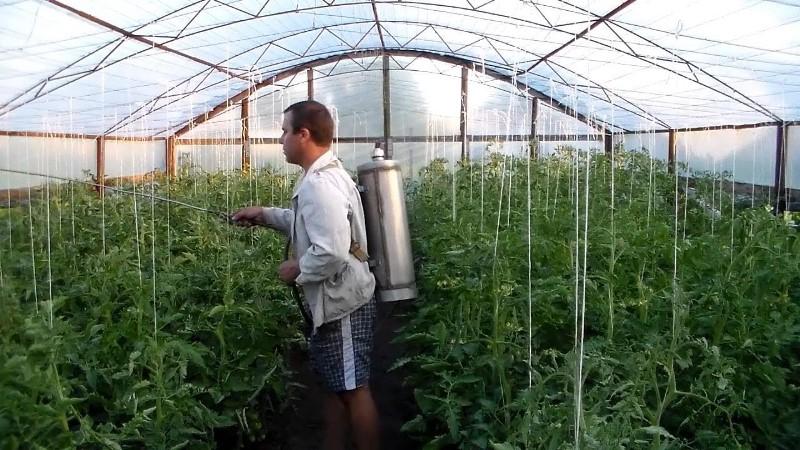How to properly spray tomatoes with potassium permanganate
Gardeners have long known that certain pharmaceutical preparations are excellent for fertilizing vegetables. For example, a manganese solution for tomatoes is one of the best processing options. Potassium permanganate is an antiseptic.
Tomatoes are often susceptible to various fungal diseases diseases, so spraying and fertilizing with potassium permanganate helps tomatoes cope with pests.
How does potassium permanganate affect tomatoes?
Potassium permanganate has long been used in growing vegetables. The effectiveness of such a product during processing is very high, and you can buy it at a pharmacy at a low price.
Manganese solution has many useful properties:
- Ideal for disinfecting crops.
- Spraying tomatoes with a manganese solution has a beneficial effect not only on tomato fruits, but also on the tops. Thanks to this processing, it becomes stronger.
- When the solution enters the substrate, a chemical reaction occurs. As a result of this reaction, oxygen atoms begin to be released. The ions released during this production have a beneficial effect on the roots of the plant, which is also important.
- In addition to disinfection, potassium permanganate performs the function of fertilizing the soil.
- Manganese helps heal wounds and cracks on fruits, which reduces the threat of infections.
Important! Despite all the beneficial properties, the treatment of cultivated plants with potassium permanganate must be strictly dosed. Oversaturation tomatoes such a solution can cause a decrease in yield.

Ways to use potassium permanganate
Due to its beneficial properties, potassium permanganate is widely used:
- disinfection of materials for landings and soil;
- disinfection of seedling containers - a solution of manganese can be used to treat containers for seedlings if they have previously been used for growing;
- fertilizing: for the fruitful development of cultivated plants, as well as to maintain their immunity and increase productivity, it is recommended to give the plants root or foliar fertilizing with a weak solution of potassium permanganate;
- fight against various diseases, such as blackleg, late blight, powdery mildew;
- disinfection of greenhouses and garden tools: a strong solution of manganese is an inexpensive and reliable means for disinfecting numerous garden tools, as well as greenhouses, greenhouses and cellars.
Tilling the soil before planting
As described earlier, potassium permanganate is ideal for disinfecting soil intended for growing vegetable crops. To do this, heat the water to 70°C and add potassium permanganate powder to it until you obtain a bright pink solution. Then water the soil thoroughly.
When it dries and cools down, start planting. Due to the high temperature of the solution, pathogens of fungal infections, as well as pests living in the soil, are destroyed.
Seed treatment
Despite the fact that stores offer a large selection of specialized disinfection and treatment products, many gardeners prefer a manganese solution.
All planting materials must be treated with a manganese solution at the preparatory stage. This will improve the quality of the tomatoes. First of all, it is recommended to pay attention to the seeds.
It is better to treat tomato seeds with a 1% solution. To prepare it you will need 1 liter of warm water and 1 g of manganese crystals.
After you have selected the seeds for planting, they need to be wrapped in gauze. Next, place them in a container with the solution and hold for about 20 minutes. It is not recommended to increase the disinfection time, as the seeds may lose their ability to germinate. Afterwards, the fabric should be rinsed in plain water and left to dry completely.
It is necessary to spray not only the seeding materials, but also the containers in which planting is carried out, because harmful microorganisms can also develop in them. To do this, you need to dilute 5 g of manganese in a 10-liter bucket of water (it is better if it is at a temperature of 80 ° C), then pour the prepared substance over all containers and soil.

How to treat tomatoes with potassium permanganate
Tomato processing includes not only the preparation of seeds. It is also necessary to water the tomatoes with potassium permanganate at the root.
To get healthy seedlings, water the soil twice and spray the plants with a pink solution of potassium permanganate. This will destroy harmful microorganisms from the soil and leaves of the crop.
To prepare such a solution you will need:
- 10 liters of water;
- 5 g of potassium permanganate.
When preparing the solution, it is important to maintain the correct proportions. As a rule, soil and seedlings are treated every ten days.
How to feed
Potassium permanganate is a necessary component for plant nutrition. Its lack in the soil negatively affects the development of plantings, leads to a decrease in their immunity, and also reduces productivity.
If the leaves of the plants begin to acquire a yellowish tint, while the veins remain green, this is the first sign of manganese starvation. Typically, this reaction occurs if tomatoes grow on neutral soil, where this element is in insoluble form.
To avoid such problems, feed the plants with a weak pinkish solution of potassium permanganate 2-3 times a season with an interval of 2-3 weeks. This will have a positive impact on the development of culture, and will also increase its resistance to negative factors.

Reviews
Treatment of vegetable crops with potassium permanganate is widely practiced by most gardeners. On specialized forums for gardeners you will find many positive reviews about this treatment option, as well as examples of the experiences of other people.
In addition, you can find many recipes and methods on how to properly treat soil and seeds, disinfect the soil, treat tomatoes against late blight in a greenhouse, feed plants and much more.
Conclusion
Tomatoes treated with potassium permanganate can produce a good harvest. This treatment will help prevent the development of diseases, protect against insects, and also destroy all existing pests. However, it is not recommended to make too strong a solution and use a large amount of pharmaceutical product. This may negatively affect further seed germination and plant maturation.